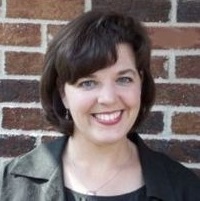Associate Professor, Georgia State University; Former Postdoc, Department of Psychiatry; 1998-1999

Interview By Monalisa Singh, MD, PhD
Postdoctoral Fellow, Dept. of Pediatrics
After receiving her doctoral degree in Clinical Psychology from University of Georgia, Dr. Anderson did her postdoctoral clinical fellowship in Psychiatry at Emory School of Medicine. Following her postdoctoral studies she joined Virtually Better, Inc., a high-tech start-up company that develops and tests virtual reality for the treatment of anxiety disorders, founded by two Atlanta based academics, Dr. Barbara Rothbaum from Emory and Dr. Larry Hodges from Georgia Tech. After working at Virtually Better for almost three years, Dr. Anderson joined Georgia State University (GSU) as a tenure-track faculty. I interviewed her to gain her insights about her unique path and how she made the successful transition from postdoc to industry and then back to academia.
How did you know it was time to move on from your postdoctoral fellowship to your first professional position?
I have a good instinct for opportunity and a high tolerance for uncertainty, so when I had the chance to join Virtually Better as their first (and only) full-time employee, I jumped. It is very unusual for a psychologist to work at a high-tech start-up company, especially straight from a postdoctoral fellowship. None of my friends had that kind of job. I knew I could continue to build my research and clinical skill sets at Virtually Better, and I also sensed the possibility of opportunities that I couldn’t even imagine at the time - it was just such a unique environment. I was right. Within my first year, the company was receiving a lot of national media attention that I learned to negotiate. I also learned a lot about starting a business . . . and that was an entirely different world from anything I learned in my doctoral program or postdoctoral fellowship.
What led you back to an academic career?
My dream has always been to be a tenure-track faculty member in a department of Psychology, but because of family considerations, I was not willing to apply broadly for academic positions. Virtually Better was wonderful because I was able to do many of the things I loved about the academy – research and clinical work, and because I was productive at Virtually Better - securing federal funding, publishing in high impact journals - I was competitive for a faculty position at Georgia State. It was not an easy decision to go back to academia, but I wanted to conduct my own research program and I wanted to mentor budding scientists. I knew that academia would grant me those opportunities
What do you enjoy about being a professor?
I thrive on the freedom and the variety of the day-to-day as a professor. I especially enjoy mentoring doctoral students and teaching undergraduates. About half of Georgia State University undergraduates are first-generation college students and it is a very diverse student body, which makes the classroom lively, rewarding and very real-world. I also appreciate the opportunity to help shape the future of the field of psychology, both by the research I do and my involvement in training. I recently finished a term as the Director of Clinical Training for the nationally accredited doctoral program in Clinical Psychology at GSU. During that time, our program was recognized as one of four “hidden gems” in Clinical Psychology from among 200+ accredited programs in the US and Canada. Finally, I was initially drawn to psychology because of my desire to help others - and as a professor I enjoy the freedom to pursue my research, which has a very applied focus.
How did your postdoc training at Emory make you competitive for an academic position?
During my postdoctoral fellowship, I worked at Grady hospital. Working side by side with the dedicated clinical professionals helped me hone my clinical skills along with my research skill sets. The opportunity to build a professional network was invaluable. Dr. Nadine Kaslow, the postdoctoral fellowship director, has spent decades mentoring junior scientists and modeling what it is to be a psychologist who makes a difference. I am grateful for the postdoctoral training at Emory that allowed me to benefit from Dr. Kaslow’s generosity, expertise and kindness.
What advice do you have for postdocs to make best use of their time?
Start a good track record for publishing and funding early on in your career. No success is “too small” – small successes have a way of building upon each other. I believe it is imperative to stay true to yourself and to do work that is consistent your values wherever you are. In academia, you must have a strong internal compass because the pressure for tenure is intense and you don’t want to lose sight of what brought you to your field. I tell my doctoral students that to be successful, you should be the very best at what you do, play well with others, be ethical, and be true to yourself. If you do, you will end up where you are meant to be – even if it isn’t where you envisioned.
This interview was published in July 2015.

